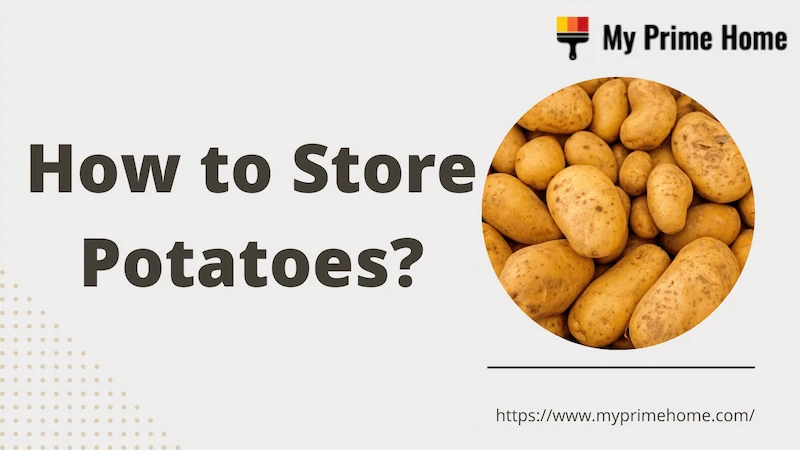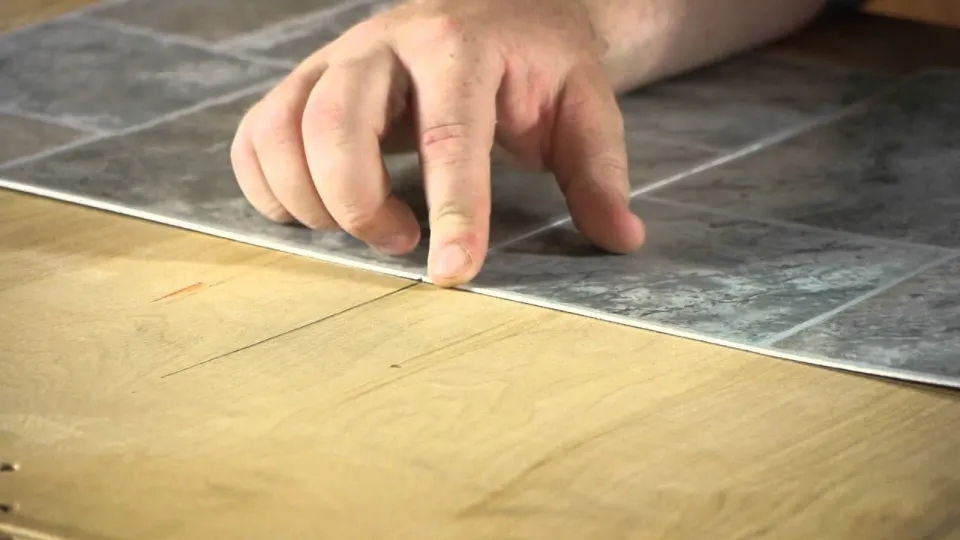The best methods for storing potatoes are discussed in this article along with advice on how to choose the most recent potatoes. So, how to store potatoes?
All you need is a cardboard box, a paper bag, a mesh bag, or a basket to store them so they stay fresh longer. Depending on how they are stored, potatoes can last for four to six months. Keep reading!
The Science Behind the Spuds
Though potatoes are certainly, well, cut off upon harvest, they continue to breathe (spooky, right?) and, in a way, live on the shelves of grocery stores and in your home. Environmental oxygen reacts with the sugars in patats and is respired out of the roots as carbon dioxide and water. It greatly slows down this inevitable decomposition, guards against sprouting, and, to some extent, sweetens the tubers when potatoes are stored in a cool, dark (but not forgotten) location.
Additionally, it’s crucial to keep potatoes and onions apart when storing them. Despite the fact that they frequently appear in the same recipes, they are not exactly two peas in a pod. But keeping them both together is more detrimental than helpful. Both of these root vegetables are very moist, which can hasten spoilage. Combined, they produce an ethylene gas that will speed up the ripening process. To maintain their long shelf life, keep them separate and in a place with good airflow.
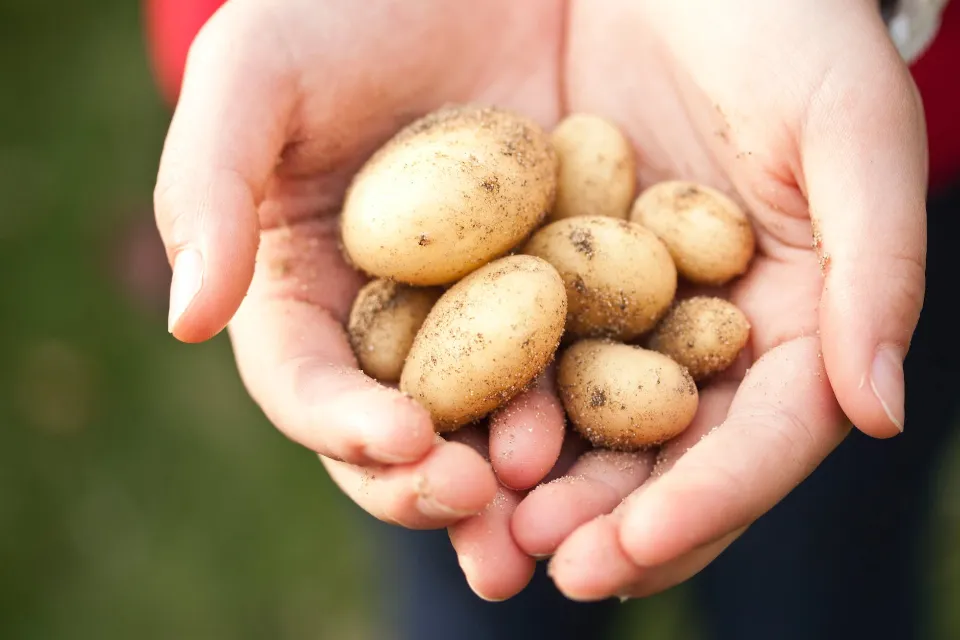
How to Store Potatoes?
Here are the details:
Don’t Store Potatoes in a Sealed Container
Avoid using airtight storage containers or closed containers with resealable lids because they will trap moisture, causing the potatoes to mold and spoil more quickly. Potatoes are best kept in an open bowl, basket, or paper bag. Just watch that they aren’t too packed—potatoes need air!
Keep Potatoes Away from Light
Bright lights from the kitchen or the sun can cause potatoes to turn an unpleasant green color. Try storing potatoes in a place that doesn’t get much light, like a dark corner of the kitchen or in a cabinet. They should be kept in well-ventilated areas wherever you store them.
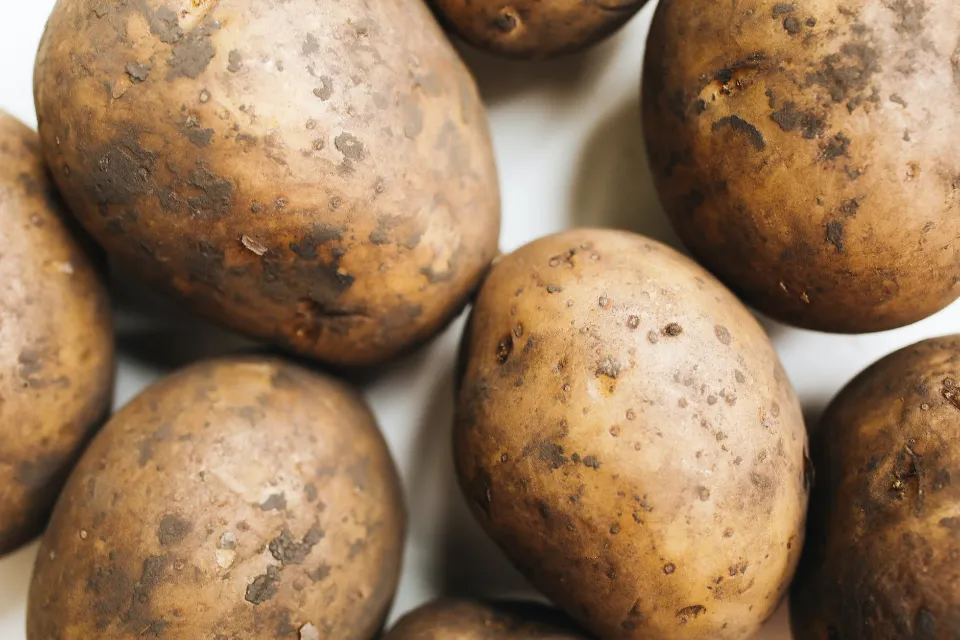
Store Potatoes in a Cool, Dry Place
Potatoes should not be kept in the refrigerator or freezer because they should be kept between 45 and 50 degrees Fahrenheit. The best location to store them is dry, cool, and dark (up to three months!) is a cool basement or garage—as long as it’s dry. If you store potatoes in the kitchen, keep them away from the stove and heater because that isn’t always practical. Potatoes should last about two weeks when stored at room temperature (68 °F). Potatoes should also be kept dry when being stored, so wait to wash them until you’re ready to use them.
Avoiding Sprouts
It’s crucial to properly store potatoes if you grow your own. Inhibitors of growth are typically sprayed on store-bought potatoes to prevent sprouting. Although most gardeners would argue that this is by no means an advantage, your potatoes won’t have it.
Potato storage should be limited to what you can use in the fall and winter. Those potatoes will begin sprouting once spring arrives. Potatoes that have sprouted are, of course, no big deal if you’re a gardener. Simply chop your potatoes into pieces so that each one has an eye, let them dry out, and then plant them in your garden. This is a great way to preserve your favorite varieties year after year without incurring any additional costs if you are growing them.
Read about
Additional Storage Tips
There’s lots more to know about storing potatoes. Keep all these tips in mind:
- Before storing your homegrown potatoes, give them time to cure.
- Do not wash potatoes until you are ready to use them.
- Keep your potatoes separate from other produce to avoid flavor blending and early ripening. Keeping your potatoes and onions separate is especially important. They both let out gases, which cause the other to ripen. This makes the potato and onion storage box a terrible idea in general.
- Choose potatoes with a reputation for storing well if you haven’t yet purchased or grown them. The storage quality of some potatoes simply outweighs that of others.
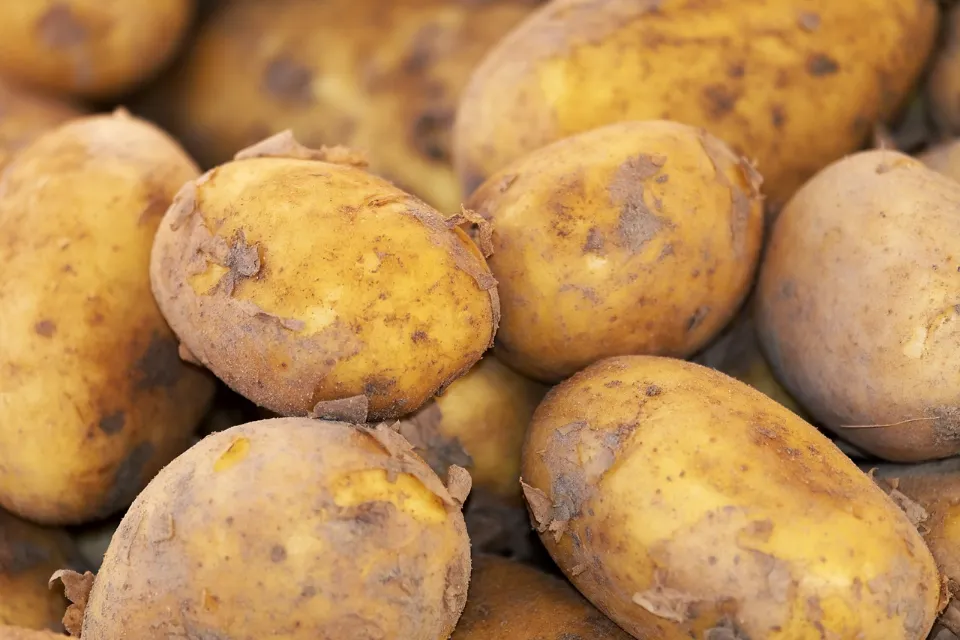
Where Should I Store Them?
You must store your potatoes in a dry, dark environment. Exposure to light or moisture can bring on rotting in the skin. In order to ensure proper ventilation for your potatoes, avoid using airtight containers or areas. Instead, use a netted bag or wicker basket. Make sure your potatoes are stored in cool environments as this extends their shelf life. Keeping your potatoes in your fridge is not recommended. Kitchen cupboards or cellars are the ideal locations as they tend to tick most of these boxes.
How Long Will They Last?
If you store your potatoes properly, they should last for several months. However, it’s important to check on them frequently because any rotting can spread if they are in close proximity to one another. It is best to get rid of any items that show signs of rotting, going green, or sprouting. You can increase the lifespan of your spud in a number of ways! If you place your potatoes in a dark place on top of newspaper at a slightly warmer temperature the skin will thicken making it less prone to bruising and rotting.
Signs That Potatoes Have Gone Bad
There are a few easy things to look for if you’re wondering, “have my potatoes gone bad?” Mold, black spots, and soft spots are obvious signs. Additionally, Dr. Benjamin Chapman, an associate professor and expert in food safety at North Carolina State University, advises against eating potatoes that are wrinkly, mushy, or shriveled. It’s not necessarily harmful to eat, but think of it like eating any other rotten fruit, such as bananas or apples. It won’t have the best flavor or texture, and it’s just not very appetizing overall.
Green potatoes, however, Dr. According to Chapman, this is a sign that the potatoes have been exposed to too much light and will release a bitter flavor, which may even irritate the digestive system.
Tips for Selecting the Best Potatoes
When bought, potatoes should be fresh and in good condition to last the longest.
When selecting, look for the following characteristics:
- Firm to the touch:Look for firm, bright qualities because soft potatoes have already started to deteriorate.
- Smooth skin:Potatoes that have been damaged by cold temperatures may develop pitted skin and brown centers, so look for smooth textures.
- Free of bruises or injuries:Sometimes potatoes can be damaged during harvest or transport. As they will spoil more quickly, stay away from those with obvious injuries.
- No sprouting:Avoid buying any produce that has already sprouted because they are one of the first signs of spoilage.
You might also think about trying some of the more unusual potato varieties, like those with blue or purple flesh.
According to studies, potatoes with bright colors have much higher antioxidant levels than those with traditional white skins.
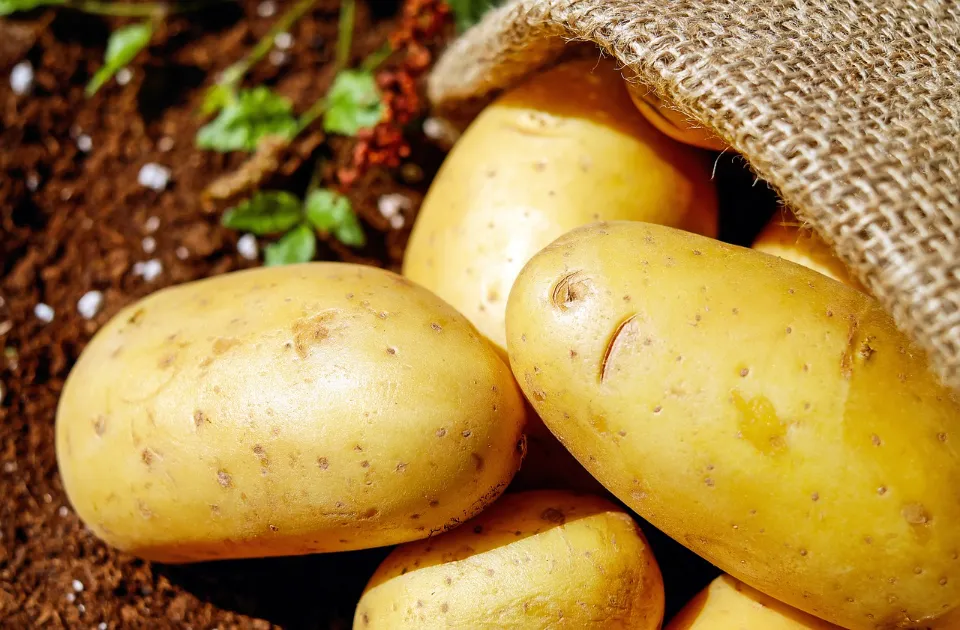
FAQs
Do Potatoes Last Longer in the Fridge Or on the Counter?
Potatoes do not require refrigeration. Not only does it not increase shelf life, the extra-cold temperature may even be harmful because it converts the starch in the vegetables into sugar.
How Long Can You Store Fresh Potatoes?
Potatoes can last for up to several months in a cool pantry. They are best consumed within one to two weeks of being stored at room temperature. Once cooked, keep them in the fridge for no more than three days.
What is the Best Container to Store Potatoes?
Instead use burlap sacks or breathable containers like paper bags, cardboard boxes, baskets and bowls to allow for air flow. Don’t freeze potatoes that are still raw. Store potatoes away from apple, banana, and onion storage areas. These items emit ethylene gas, which hastens the rotting of potatoes.
How Do Farmers Store Potatoes?
If they aren’t washed, potatoes keep the longest. After gathering them from the garden, spread them out in a single layer in a well-ventilated area to allow the soil to dry on the tubers. Lightly brush off excess dirt before you pack them. Fill a clean wooden or waxed cardboard bin with dry, unwashed potatoes.
Summary: How to Store Potatoes?
Knowing how to store potatoes properly can increase their shelf life and decrease food waste.
Uncooked potatoes should not be kept in the refrigerator, but rather in a cool, dark location with good airflow.
Slices should be cut, peeled, and covered in water or vacuum-sealed to prevent browning.
Cooked potatoes can be kept in the refrigerator for up to four days, or in an airtight container in the freezer for up to one year.
In regards to homegrown potatoes, cure them briefly at warmer temperatures and high humidity before long-term storage.
Look for firm, smooth, spotless tubers with no signs of sprouting. Potatoes will last longer regardless of storage method if they are fresh and healthy when purchased.
If you have any questions, please leave a comment. My Prime Home tries to give you the best furniture information. Thank you for reading.
